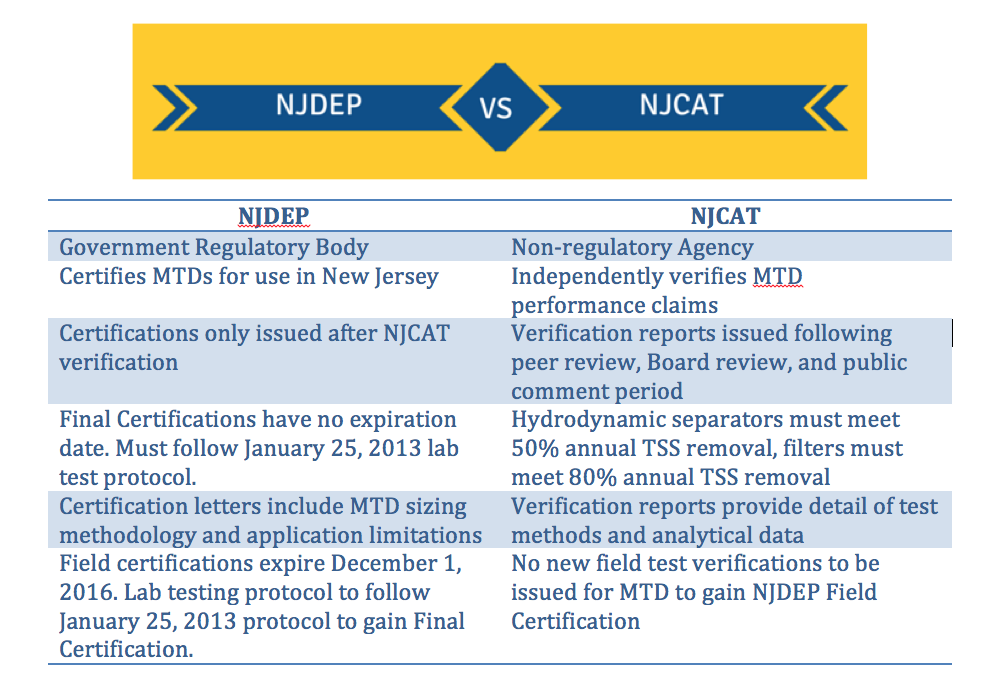|
A growing number of local stormwater regulatory agencies and engineers are looking to the New Jersey Department of Environmental Protection (NJDEP) and/or the New Jersey Corporation for Advanced Technology (NJCAT) to provide a basis for the approval of manufactured stormwater treatment devices (MTDs). But there are some very important distinctions to be made since they are not one in the same.
Verification versus Certification NJCAT is a non-regulatory agency that issues independent MTD performance claim verifications for hydrodynamic separators and filtration devices. Only after gaining NJCAT verification will NJDEP issue MTD certification which provides regulatory authority for the device to be sold in New Jersey according to the conditions listed in the certification letter. It is very important to keep in mind that just because an MTD holds an NJCAT verification, it does not necessarily mean that the device is eligible for NJDEP certification. While NJCAT can verify a performance claim, but if that claim does not strictly meet the NJDEP-administered test protocol then the device is not eligible for NJDEP certification. For example, if an MTD’s lab test verification was based on a coarser test sediment particle size distribution than that of the test protocol specification, then that verification would not qualify for NJDEP certification. Some stakeholders rely on just the NJCAT verification for MTD approval to allow for its specification. Performance claim verifications are issued based on the MTD’s capabilities following a comprehensive peer review and public comment period. However, NJDEP certification letters include a sizing method that is specific to New Jersey. MTD approvals based on the full adoption of NJDEP certifications creates a level playing field for sizing those devices and provides a straightforward approval approach for agencies having limited resources to evaluate MTD performance claims. Claims and Limitations NJCAT verifications are based on the actual tested performance capabilities of an MTD in the lab or in the field. But according to New Jersey Stormwater Rules, NJDEP certifications for hydrodynamic separators are limited to 50% annual total suspended solids (TSS) removal efficiency regardless of whether a device was verified by NJCAT to achieve a higher performance rating. In addition, NJDEP assigns 80% TSS removal efficiency for verified filtration MTDs regardless of demonstrating higher performance capabilities. New NJDEP Certification Rules All MTD certifications were set to expire on January 25, 2015 unless an MTD gained NJDEP “Final Certification” following the January 2013 lab test protocol. There is no expiration date for a Final Certification. And, if an MTD held NJDEP “Field Certification” as of the expiration date, a new expiration of December 1, 2016 applies. A lab test verification following NJDEP’s 2013 lab testing protocols will be needed to gain MTD Final Certification by December 2016. Current NJDEP MTD Laboratory Test Certifications and Field Test Certifications are available at njstormwater.org. The NJCAT verification database is also available. The following table summarizes the comparison between NJDEP and NJCAT.
1 Comment
Mark
5/12/2015 05:49:14 am
Very important distinctions that often get blurred.
Reply
Leave a Reply. |
AuthorAquaShield staff keeping you up to date on the latest in stormwater solutions. Archives
December 2015
Categories
All
|
|
AquaShield, a Komline Company
2733 Kanasita Drive, Suite 111 Chattanooga, TN 37343 Toll Free: 888.344.9044 | Phone: 423.870.8888 © 2000-2024 AquaShield™. All Rights Reserved. |
VISION STATEMENT
To be the vanguard for providing technology that gives higher quality usable water to every country and community that needs it.



 RSS Feed
RSS Feed